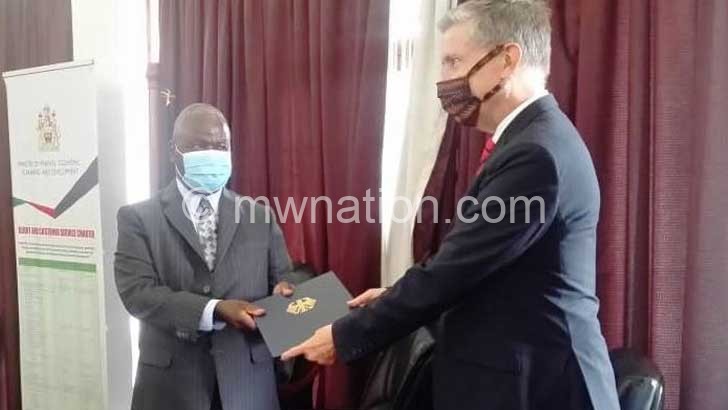Germany provides K11bn for Covid-19 response
The German Government has committed 13.25 million euros (about K11.3 billion) to support Malawi’s National Covid-19 Preparedness and Response Plan.
In a statement issued yesterday, the German Embassy states that Minister of Finance Felix Mlusu received official communication from German Ambassador Jurgen Borsch on Friday about the new commitments.
The funding is for health, social protection, economic recovery, wildlife protection and nutrition security.

During the handover, Mlusu hailed the support as timely as the government is mobilising resources for the pandemic response.
On his part, Borsch said: “The Covid-19 pandemic is an unprecedented global challenge that will only be succeeded by unprecedented solidarity. Currently presiding the European Union, Germany shows its solidarity with the Malawian people as a long-lasting friend and as a strong member of the #Team Europe.”
From the financing, three million euro (about K2.5 billion) for the Health Services Joint Fund are foreseen for most urgent needs within Malawi’s National Preparedness and Response Plan.
Germany’s ongoing technical cooperation in health will also support infection prevention and the continuity of basic health services in line with the response plan and an additional one million euro (about K855 million) is foreseen for the support.
Within its Social Protection of the Ultra-poor Programme three million euros (about K2.5 billion) will be provided for the extension of social cash transfers to poor people severely affected by the economic aftermaths of the pandemic.
Last Wednesday, Borsch met Minister of Health Khumbize Chiponda at the ministry’s headquarters in Lilongwe where he pledged his government’s continued support to Malawi’s health sector amid Covid.
In addition, the German government announced the supplementary funds of 2.25 million euros (about K1.9 billion) for the Multi-Sectoral Nutrition Programme including Early Childhood Development, implemented by Unicef.
The funds were provided through Germany’s Special Initiative One World No Hunger.





